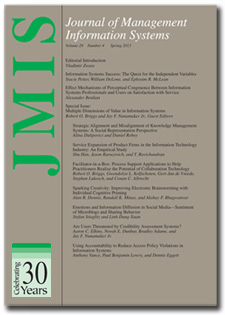人工智能让大学教育变得不那么必要了吗?来自企业层面劳动力结构变化的证据
IF 5.9
2区 管理学
Q1 COMPUTER SCIENCE, INFORMATION SYSTEMS
引用次数: 10
摘要
摘要作为一种通用技术,人工智能有望改变我们社会的几乎所有行业和方面。因此,了解企业内部与人工智能应用如何改变劳动力相关的潜在变化很重要。使用2007年至2018年中国1300多家上市公司的面板数据集,我们研究了人工智能应用程序与企业劳动力结构之间的关系,包括受过或没有受过正规大学教育的员工。研究表明,人工智能应用与整体就业以及没有大学学历的非学术培训工人的就业呈正相关。这些关联在服务业比在制造业更为重要。进一步的因果分析表明,人工智能应用的增加对公司雇佣未经学术培训的工人及其整体就业有积极影响,但对经过学术培训的员工有负面影响。我们将这些发现归因于人工智能的技术去计费效应。研究结果表明,为了应对人工智能应用不断增加带来的潜在劳动力转型,信息系统研究需要关注劳动力的结构变化,以及为人类员工与人工智能并肩工作做好准备的意义。本文章由计算机程序翻译,如有差异,请以英文原文为准。
Is College Education Less Necessary with AI? Evidence from Firm-Level Labor Structure Changes
ABSTRACT As a general-purpose technology, artificial intelligence (AI) is expected to transform almost all industries and aspects of our society. Thus, it is important to understand the potential changes within the firms related to how AI applications change their labor force. Using a panel dataset with over 1,300 publicly-traded companies in China from 2007 to 2018, we examine the relationship between AI applications and firm labor structure with workers with or without formal college education. The study indicates that AI applications were positively associated with the overall employment as well as the employment of nonacademically- trained workers with no college degrees at the firm level. These associations were more significant in the service sector than in the manufacturing sector. Further causal analysis shows increasing AI applications have a positive effect on a firm’s employment of nonacademically-trained workers and its overall employment but a negative effect on academically-trained workers. We attribute the findings to the technology deskilling effect of AI. The findings suggest that, in response to the potential labor force transformation with increasing AI applications, information-systems research needs to focus on structural changes of labor forces and the implications for preparing human employees to work with AI side by side.
求助全文
通过发布文献求助,成功后即可免费获取论文全文。
去求助
来源期刊

Journal of Management Information Systems
工程技术-计算机:信息系统
CiteScore
10.20
自引率
13.00%
发文量
34
审稿时长
6 months
期刊介绍:
Journal of Management Information Systems is a widely recognized forum for the presentation of research that advances the practice and understanding of organizational information systems. It serves those investigating new modes of information delivery and the changing landscape of information policy making, as well as practitioners and executives managing the information resource.
 求助内容:
求助内容: 应助结果提醒方式:
应助结果提醒方式:


